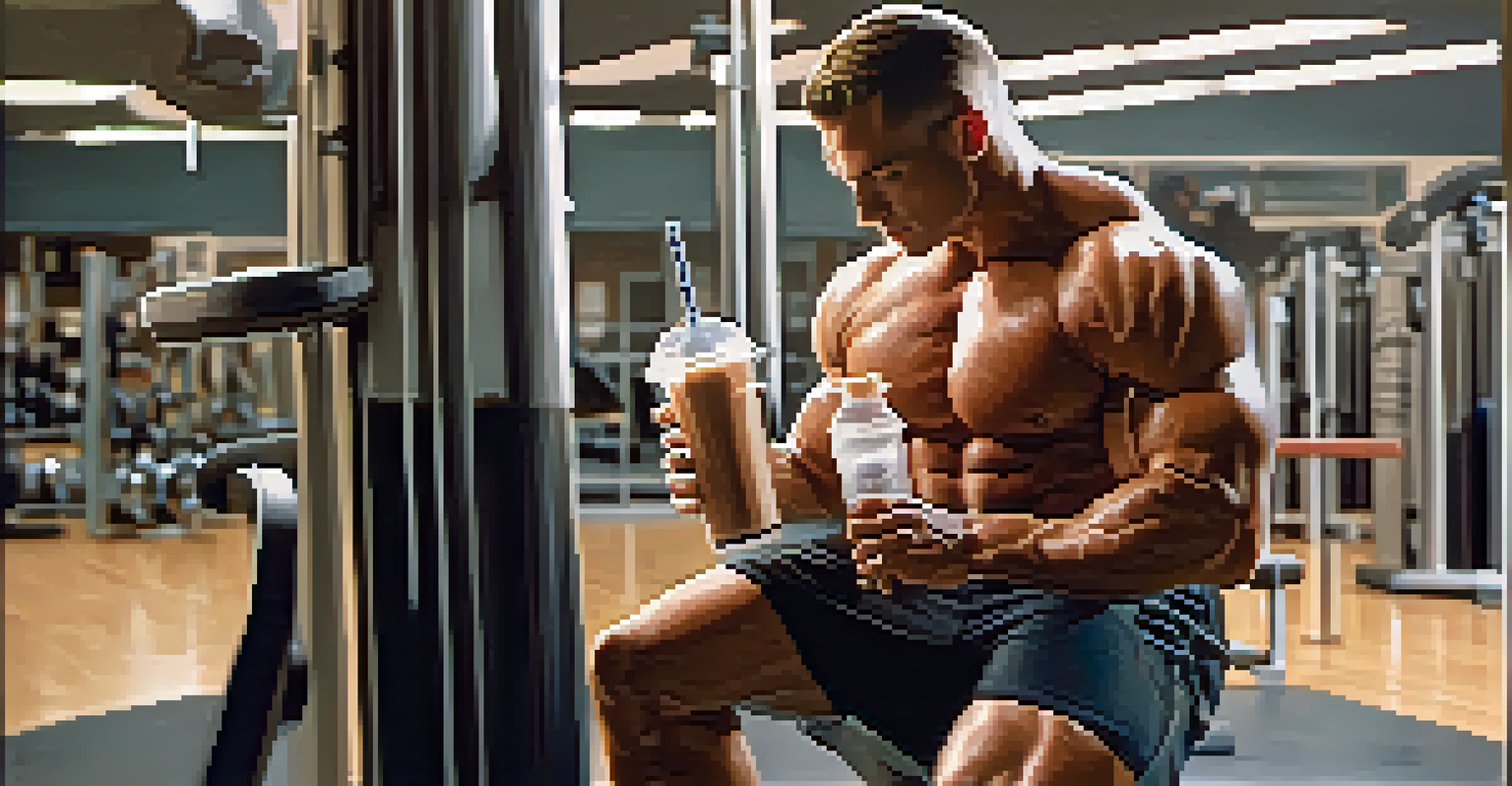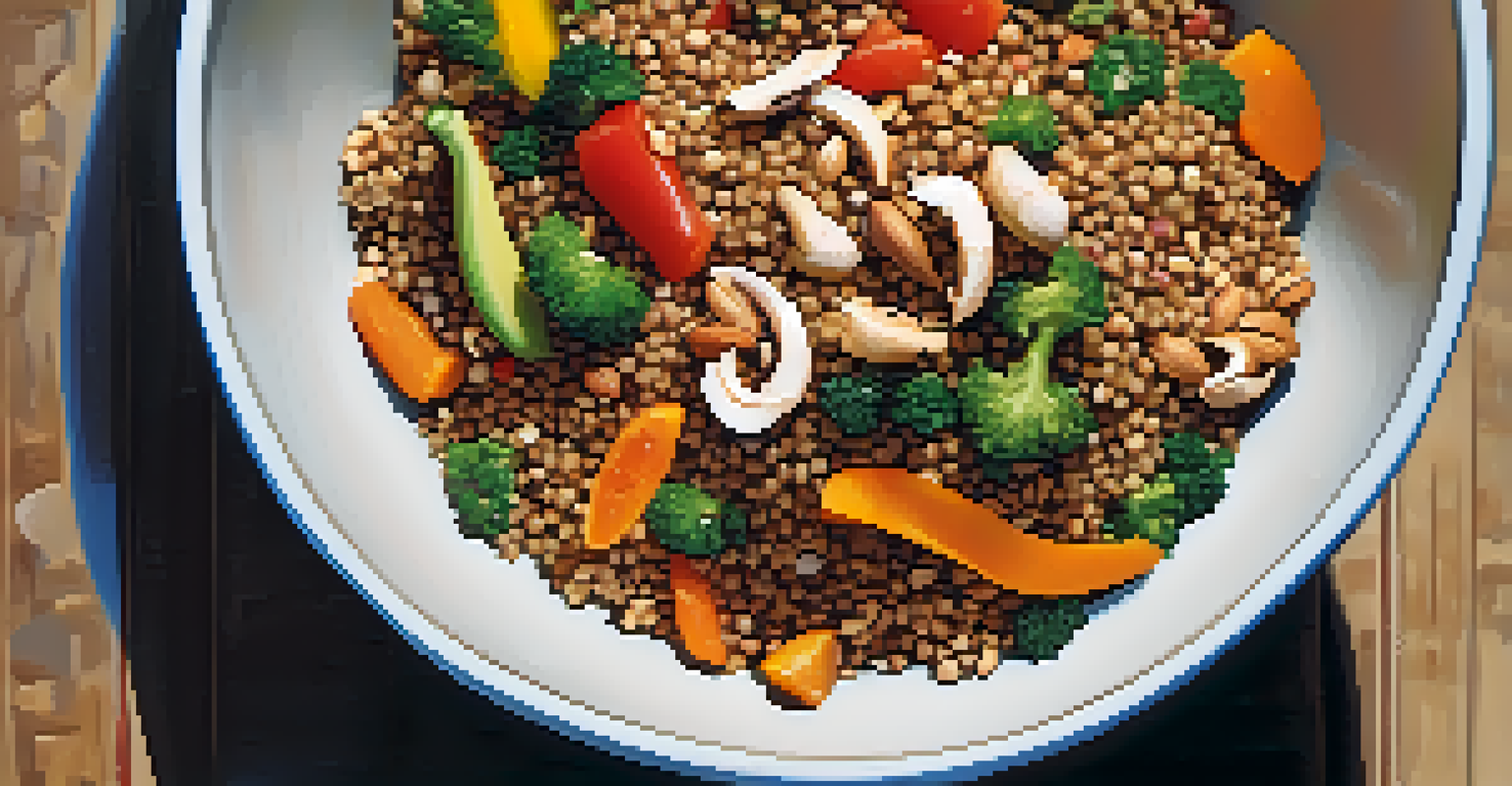Supplements vs. Whole Foods: Which is Better for Bodybuilders?

Understanding Supplements: Pros and Cons
Supplements are products designed to enhance nutrition, often packed with vitamins, minerals, and protein. While they can be beneficial for bodybuilders aiming for specific goals, they are not a substitute for a balanced diet. The key advantage of supplements is convenience; they allow for quick nutrient intake, especially post-workout when your body craves recovery fuel.
Let food be thy medicine and medicine be thy food.
However, relying solely on supplements can lead to nutritional gaps. Whole foods contain a variety of nutrients that work synergistically, offering benefits that isolated supplements cannot replicate. For instance, while a protein powder can provide protein, it lacks the vitamins and minerals found in whole foods like chicken or beans.
Moreover, not all supplements are created equal. The supplement industry is less regulated, so quality can vary significantly. This is why it’s essential for bodybuilders to do their research and choose reputable brands to ensure they are getting safe and effective products.
The Power of Whole Foods in Bodybuilding
Whole foods are unprocessed or minimally processed foods that retain their natural nutrients. For bodybuilders, they provide essential macros and micros that support muscle growth and recovery. Foods like lean meats, whole grains, fruits, and vegetables offer a broad spectrum of nutrients that contribute to overall health and performance.

Not only do whole foods supply protein, carbohydrates, and fats, but they also come packed with fiber, antioxidants, and phytochemicals. These components are crucial for reducing inflammation and promoting recovery after intense workouts. For example, a bowl of quinoa with vegetables and grilled chicken provides not just protein but also fiber and vitamins that support muscle function and digestion.
Supplements: Convenient but Limited
While supplements offer convenience for nutrient intake, they cannot replace the comprehensive benefits of whole foods.
Eating a variety of whole foods can also help prevent the monotony that sometimes comes with a strict supplement regimen. By incorporating different foods, bodybuilders can enjoy diverse flavors and textures, making their diet more enjoyable and sustainable in the long run.
Comparing Nutrient Density: Supplements vs. Foods
Nutrient density refers to the amount of essential nutrients in a food relative to its calorie content. Whole foods generally have a higher nutrient density compared to most supplements. For instance, a serving of spinach is not only low in calories but also rich in vitamins A, C, and K, while supplements often provide isolated nutrients without the added benefits of whole food sources.
The greatest wealth is health.
While some supplements can deliver concentrated doses of specific nutrients, they may lack the full range of benefits that whole foods provide. For example, vitamin C is abundant in citrus fruits, which also offer fiber and other antioxidants that enhance overall health. Relying solely on a vitamin C supplement may not provide the same health benefits as consuming a whole orange.
Ultimately, it's about balance. Supplements can fill in the gaps when whole foods fall short, but they shouldn’t replace them entirely. A bodybuilder who prioritizes nutrient-dense whole foods while using supplements strategically is likely to see better results in their training and overall health.
Timing and Convenience: When to Use Supplements
For bodybuilders with busy schedules, supplements offer a convenient way to get necessary nutrients on the go. Post-workout protein shakes are a popular choice, as they provide the quick protein boost needed for muscle recovery. This timing can be crucial, especially after a strenuous workout when your muscles are most receptive to nutrients.
Supplements can also be beneficial for those who struggle to meet their daily nutritional needs through whole foods alone. For example, if a bodybuilder finds it challenging to consume enough protein from food sources, a protein supplement can help bridge that gap without overwhelming their digestive system.
Whole Foods Boost Performance
Whole foods provide essential nutrients that support muscle growth and recovery, making them foundational for bodybuilders.
However, it’s essential to remember that convenience should not override the importance of whole foods. Ideally, supplements should complement a well-rounded diet rather than serve as a primary source of nutrition. This balance ensures that bodybuilders can achieve their fitness goals without compromising their health.
Real-Life Examples: Bodybuilders Who Prefer Whole Foods
Many successful bodybuilders attribute their success to a diet rich in whole foods. For instance, renowned bodybuilder Ronnie Coleman often emphasized the importance of whole food sources like steak, chicken, and sweet potatoes in his diet. His approach highlights the belief that whole foods provide the necessary nutrients for optimal performance and recovery.
Similarly, athletes like Dwayne 'The Rock' Johnson have been known to consume a massive amount of whole foods daily, including fish, rice, and vegetables. Their dedication to whole foods showcases a commitment to nutrition that goes beyond quick fixes, aiming for long-term health and fitness.
These real-life examples demonstrate that while supplements have their place, many top bodybuilders rely heavily on whole foods to fuel their training, sustain energy levels, and maintain overall health. This emphasizes the message that food is foundational in any bodybuilding journey.
Potential Risks of Over-Reliance on Supplements
While supplements can be beneficial, over-reliance on them can lead to several health risks. For one, excessive intake of certain vitamins and minerals can lead to toxicity. For example, fat-soluble vitamins like A, D, E, and K can accumulate in the body and cause adverse effects if taken in high doses.
Moreover, focusing too much on supplements may cause individuals to neglect their overall dietary habits. This can result in a lack of variety and important nutrients that whole foods provide. For instance, someone who relies on protein shakes might miss out on the fiber and healthy fats found in whole food sources like nuts and seeds.
Balance is Key for Bodybuilders
Finding the right balance between supplements and whole foods is crucial for optimizing health and fitness goals.
It's essential for bodybuilders to approach supplementation with caution and awareness. Consulting with a healthcare professional or nutritionist can help ensure that any supplements taken are necessary and appropriate for one's individual health needs.
Finding the Right Balance: Supplements and Whole Foods
The key to optimizing performance as a bodybuilder lies in finding the right balance between supplements and whole foods. Whole foods should form the foundation of any diet, providing essential nutrients needed for muscle growth and recovery. Supplements should be viewed as a supportive addition rather than a primary source of nutrition.
Bodybuilders can begin by assessing their dietary needs and goals. For those who are meeting their nutritional requirements through whole foods, supplements may not be necessary. However, if there are gaps—such as insufficient protein intake or specific nutrient deficiencies—then supplements can help fill those voids effectively.

Ultimately, the best approach is a personalized one. Each bodybuilder's journey is unique, and what works for one individual might not work for another. Regularly reviewing and adjusting one’s diet—whether that includes whole foods, supplements, or both—can lead to a more successful and fulfilling bodybuilding experience.